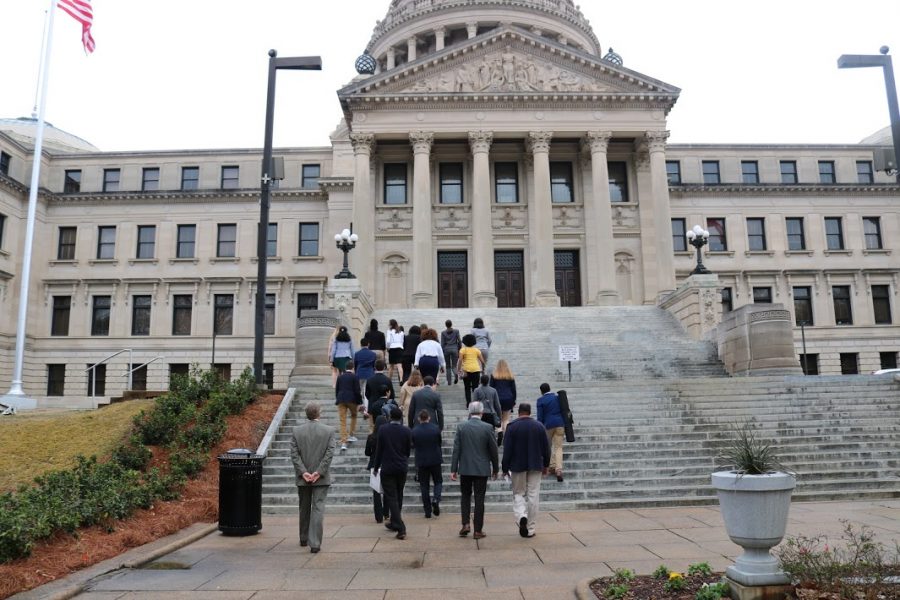Reece: Moving Forward
Mississippi rejected all candidates on the Democratic ticket last Tuesday– but the fight’s not over.
November 14, 2019
In Mississippi, two things are concrete: Christianity and conservatism. It’s the cornbread and butter that I was raised on in the rolling hills of the Tombigbee. It’s the backbone of the fundamental lifestyle of everyday Mississippians, and it will one day be blamed as Mississippi’s downfall.
Last Tuesday, voters across the state flocked to their local precincts to cast their vote for state-wide office. Going into the election, Mississippi had one Democratic holdout in state office, Attorney General Jim Hood.
Now, in an attempt to approach this issue as transparent as possible, I did intern for the Hood for Governor campaign, and I enjoyed the hell out of it. Despite his loss on Tuesday seemingly meaning that my summer was spent on a campaign doomed for disaster, I would do it all over again in a heartbeat. The people, the staff and the hope that was instilled in me were inspiring at least and life-changing at best.
When Mississippians woke up Wednesday morning, they discovered that the lone Democrat in Mississippi Dixie had been defeated by the Republican crown prince of Southern politics, Tate Reeves. Reeves always knew that one day he will be coronated governor of the state. After all, he declined Governor Phil Bryant’s invitation to replace Thad Cochran’s vacant seat in the US Senate that ultimately went to Cindy Hyde-Smith. Reeves has eyed the Governor’s mansion ever since he was State Treasurer, and come January, he will finally ascend the throne of Mississippi.
That isn’t to say that Reeves’ rise to the governorship wasn’t riddled with challenges and tribulations. Before his campaign even hit the ground running, Reeves’ popularity was a little less than stellar. His reluctance to raise teacher pay adequately to match the Southeastern average and Mississippi’s economy, listed as the 47th in the union according to USA Today, remaining roughly stifled since the Great Recession.
Given that Reeves has held one of the most constitutionally powerful roles in the Mississippi government for eight years now, it is unlikely that these numbers will change. Mississippi will still be poor. Mississippi will still suffer from crumbling infrastructure and abysmal healthcare nightmares. Students will continue to receive inadequate funding leading to brain-drain and poor education for years to come. That’s not to say that Reeves’ opponents went down without a fight. Reeves faced tough competition in both the primary election and general election. Former state Supreme Court Justice Bill Waller, Jr. gave the establishment Reeves a fair fight in the Republican primary, forcing the Lt. Governor into a runoff. Hood also ran a competitive campaign in the general election, with Reeves receiving 52.1 percent of the vote compared to Hood’s 46.6 percent, outperforming all former Democrats in recent history, including Mike Espy in his 2018 bid to unseat Cindy Hyde-Smith.
Along with Reeves’ victory, every Republican on state-wide tickets won their respective race and Republicans held both chambers of the state legislature. With Jim Hood’s defeat, Mississippi has officially become a one-party state, a die-hard Republican stronghold. This does not surprise many, but Jim Hood was the Democrat’s only plausible winning ticket this year, and his defeat signifies more than just the death of the Mississippi Democratic Party. It signals the stagnant growth that Mississippi will continue to exhibit. It’s the rut that Mississippi will never be able to climb out of until meaningful change occurs.
In her opinion piece posted by the Jackson Free Press following her defeat by Republican Lynn Fitch, Democratic Attorney General Candidate Jennifer Riley-Collins detailed her experience running against an opponent who rarely made public appearances that also featured Riley-Collins and refused any notion of debate against her opposition. “So [Fitch] simply sat back and waited to be positioned,” Riley-Collins wrote. “That, my friend, is ‘privilege’ at its finest.”
Riley-Collin’s notion that Fitch simply coasted by to the AG office was spot on. Why waste time and energy running a campaign when it’s a given that you would win no matter what? And on the other hand, why put time and energy into a campaign that was doomed from the start, knowing you’re going to lose no matter what?
Collins recalled civil rights icon and Mississippi native Fannie Lou Hamer’s words on whether or not the system will ever work. “We have to make it work,” Hamer said. “You’ve got to fight. Every step of the way, you’ve got to fight.”
“So I did,” Riley-Collins wrote. “I fought every step of the way.”
In our mock election held two weeks ago, you, the student body and faculty, voted overwhelmingly for the Democratic candidates because of your desire to see real change. Were Jim Hood and Jennifer Riley-Collins or Jay Hughes and Johnny Dupree going to be the saving grace for Mississippi? Were they going to be the catalyst to shoot Mississippi to the top and become the most prosperous state in the union? No. But they gave us hope. They inspired us and gave us courage. They inspired our desire for change in healthcare, education and infrastructure. They encouraged us to be the change that we want to see in our communities.
Jim Hood fought. Jennifer Riley-Collins fought. Now, it’s your turn to fight.











Anicia Hill • Nov 19, 2019 at 3:56 pm
Excellent! It is your turn to make a stand!